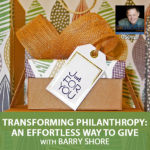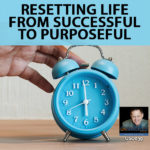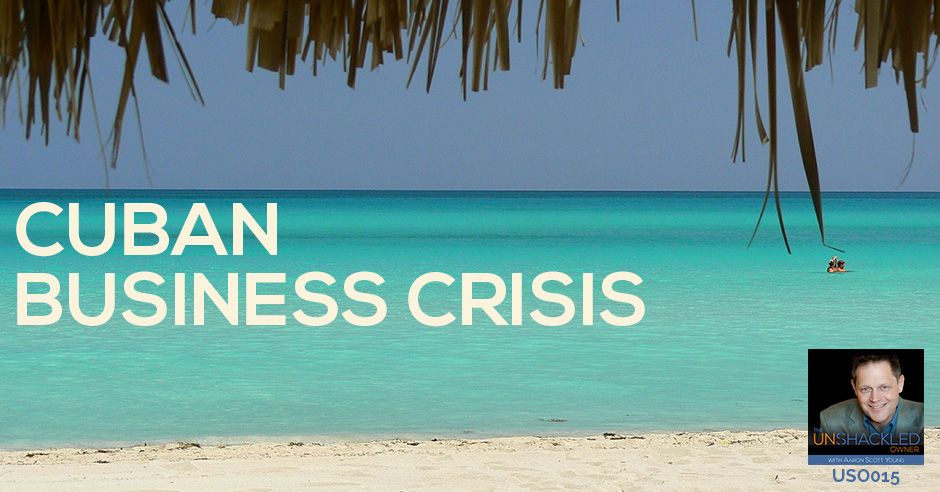
My wife and I celebrated our 30th wedding anniversary so we went on a fantastic trip to Cuba. The place was amazing and beautiful. We stayed at an Airbnb and our hosts were very gracious. But aside from all that, I realized something very important from the people there and the situation they’re in, in terms of being an Unshcakled Owner. More importantly, I realized this from what the people were doing about the situation that they’re in.
Listen To The Episode Here
Cuban Business Crisis
Welcome to The Unshackled Owner episode fifteen, what I’m calling the Cuban Business Crisis. This is Aaron Young, I’m your host. I just got back from a fantastic trip to Cuba. My wife and I celebrated our 30th wedding anniversary. We thought about what would be fun, what we would like to do and we decided, “Let’s go to Cuba.” We thought, “It’s always been off limits to us. Now, we can go. Let’s go.” We did that and off we went to that little island about 90 miles off the coast of Florida. We were expecting to have a lovely trip and a good time together, but amongst all the fun and amongst all the interest, I was fascinated by what’s going on in Cuba business-wise, and how it applies to what we’re doing here, and especially how we can learn some lessons there to help us become a better, more unshackled owner. This is just going to be a monologue today. This isn’t an interview. I just wanted to tell you a little bit about my Cuba trip.
We get down there and we’re staying in an Airbnb. It was a great place. We were very surprised that the price, it was only $404 for a whole week in a nice apartment that was attached to a house. We had a little sitting area, a kitchenette, a bedroom with air conditioning, a full bathroom to ourselves, private entrance through a really beautiful little garden. It was a beautiful place. If you’ve ever been to the Caribbean islands at all, you know there’s just an abundance of flora. Plants are gorgeous, they grow, they have huge waxy leaves. Of course, it’s warm, it’s humid. It was in the low 80s every day and dropped down to the 60s at night, but never felt cold.
We were there in this great place and we met the people that were our hosts who had only recently been able to start to use part of their house as an Airbnb because it’s been challenging to use services like Airbnb in Cuba because of all the embargo and the restrictions. This was a new business for them. You need to understand, the average Cuban makes $25 per month. While they do have some of their food supplemented by the government and the government gives them a job to do, even if you are supposed to be rationed a certain amount of bread or chicken or cooking oil or whatever, it’s very limited stuff, that doesn’t mean you always get it. It’s first come first served.
In the context of this $20, $25 a month average income, you go into the Supermercado, the grocery store, and it’s just empty shelves. You walk in there and just imagine sort of a rundown version of going into a Safeway store, down the aisles. Here’s an entire aisle that’s empty then the next aisle might have just one style of vegetable oil down the whole thing, then the next aisle’s got a few jars of baby food and the next aisle’s got nothing and the next aisle’s got a bunch of boxed milk. It was a crazy thing. You go back to the beautiful butcher section, the meat section, which has great pictures of fish and beef and everything up on the wall. But then you look in the cases and they’re empty or they’re just full of packages of half freezer-burned looking hotdogs. It’s kind of depressing actually to see at all.
The Supermercado wasn’t what was fascinating. That is what the average individual is having to deal with. We were dealing with people who were head started and gotten permission to do a little business. When Raúl Castro took over from his brother Fidel back in ’08, he knew that the economy was not going to recover. It’s been sluggish for 58 years. He wanted to start doing things to increase opportunity because the government could not continue to support people, supply money to people and supply food to people in a meaningful way. They started to ease the complete restriction of private business.
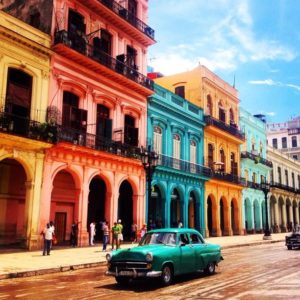
Cuban Business Crisis: They wanted to get rid of the class system, that’s what the revolution back in 1959 was about.
They wanted to get rid of the class system, that’s what the revolution back in 1959 was about. They wanted to get rid of classes. If they could make everybody even and equal and put them on an equal plain field and everybody would be distributed what they needed to do their task and to live their life and to support their family, that it would be okay. They stuck with that for a long time. Of course, it doesn’t work. We’ve seen the Soviet Union, East Berlin, all that all crash. Cuba was crashing so they started back shortly after ’08 to ease the restrictions but still very, very restrictive.
Then just last year, in May of 2016, they allowed for private enterprise, some privately owned businesses of micro and small, up to medium sized businesses. They don’t define what medium or small is, but micro we can assume is one or two people. Most of these businesses work from home, which doesn’t sound so unfamiliar to us. Lots of businesses that are created in the home, as a matter of fact, we ate in a number of what they call Paladar Particulares, which are restaurants in people’s homes. You walk in the front door and you go maybe upstairs onto their terrace and you go passed the bedrooms and so on. They’ve converted their living room into tables and their little tiny balcony into a few tables. They make you food and they make you whatever they have access to and you eat. It’s actually really good and it’s very intimate. There are state run restaurants and private restaurants. In the private restaurants, the food is dramatically better because the people have to compete. Whereas the state run restaurants, the food is bland at best and not a lot of choices and the service is marginal. In these privately owned places, they really are bending over backwards to take great care of you.
Our host had been an economist for Cuba for 50 years. He’s a 79 year old man who fought in the revolution back in 59. He explained that of the about twelve million people in Cuba, about a half million people had taken the leap of faith and gotten off the government dole and gotten permission to either start their own business or to work for a privately owned business. Now, about a half million people were engaged in private enterprise. The government was continuing to try to either expand the opportunities or reduce the restrictions on these kinds of businesses because they were starting to come along. The problem is, some of the people who are now in this capitalistic context rather than the socialistic or communistic context, were starting to make money. They were leaving the other people behind.
Our hosts were making $50, $60 a day from renting a room, whereas the average person is making $25 a month. The Cuban official cab drivers don’t make very much money, but the guys who’ve been able to save up or inherit one of these old cars from the 50s and 60s and have kept it in good shape, they can get $20, $50, $100 to take you out for a quick ride or for a few hours. They can make, in a short amount of time, what would’ve taken them half a year to make before they had the opportunity to be a little bit of a capitalist and to compete. Not only were they competing for your business to drive you around, they of course made deals with some of the private little businesses that are selling t-shirts or the restaurants or the Cuban cigar people. They’ve figured out how to make money. It was fascinating to watch.
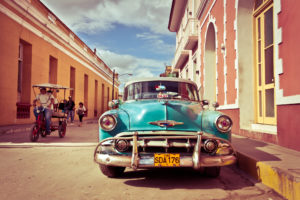
Cuban Business Crisis: What can we do with what we have where we are right now? How do we take whatever bits and pieces and do something unique with them?
Here’s the real thing that got me, folks, was that these people still have almost no access to being able to buy stuff from outside of Cuba or to sell the stuff they create outside of Cuba. As a matter fact, there’s almost no export from Cuba. What that means is they have to figure out, “What can we do with what we have where we are right now? How do we take whatever bits and pieces surround us and do something unique with them so that we can generate, create a product or a service that will be desirable to tourists, to other local Cuban people? What can we do?” The thing that’s amazing is a lot of us here in United States, we fall into these traps of, “Here’s what everybody else is doing so I’m going to try to do it too. I’m frustrated because I’m not getting the results that these gurus tell me I’m supposed to get. I’ve spent money, but I’m not getting the life change and the transformation that I wanted.”
Because all you’re doing is you’re following somebody else’s plan. You’ve helped them get rich without you really learning how to think about your business on your own. I love Einstein’s quote that, “You cannot solve a problem with the same mind that created it.” That’s his actual quote, by the way. In other words, you can’t get different results using the same old thinking that got you into the problem. These Cubans are constantly in a state of being ingenious, constantly trying to figure out, “How can I take this sow’s ear and turn it into a silk purse?” I watched them all through the seven days that we were there and the old adage that any problem can be solved with a little bit of ingenuity just was alive and flourishing in Cuba.
What can we do, here in this country where we have so much abundance, we have so much access to. Look, these guys don’t even have the internet really. Down there, for $2.50 if you want to go stand in a long line at the phone company, or for about $4 from a hotel concierge, you can buy a one hour internet card. It’s a little thing with a code on it and you can go to one of about five parks in all of Havana. Havana’s a big city. There are five internet parks that I was able to identify and then a handful of hotel lobbies or restaurants where you could get on the internet. There’s no internet in the homes, there’s no easy access to internet. Even internet on the phone, on your smartphone, was a brand new thing and you had to pay upfront amount of money that most people don’t have. Most people don’t have internet on their phone. They buy these little expensive cards, they go sit in a park and they try to squeeze in whatever they’re going to do on the internet within the 60 minutes that the card will allow. You can’t buy a bunch of cards because there are only so many that are given out each day. It’s very restrictive.
These guys are having to figure out how to deal with no access to Google, no access to eBay, no way to buy stuff from the outside world, even make jewelry or anything. They have to figure out, “What do I do with what I’ve got right here, right now?” They’re doing it and they’re creating a whole new class of entrepreneurs that are stepping up. So much of the government is a little worried about it because they don’t want the class system to come back. These entrepreneurs, this part of a small group that’s half a million people, are now outstripping their neighbors by exponential numbers. They’re making so much money in a capitalistic environment that they could have never made in the socialistic environment.
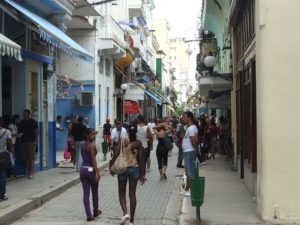
Cuban Business Crisis: When you’re guaranteed a job, there’s no reason to go out of your way because you can’t get fired.
I want you to think about that too, by the way. I’m not trying to be political on this. I’m telling you, this is what I observed happening in real time in a country that has tried to go socialist, where they tried to redistribute the wealth of the upper class and try to make it easier for the people at the bottom. It’s a great and noble idea, but it takes away that need for ingenuity, it takes away that need for competition. When you’re guaranteed a job, there’s no reason to go out of your way because you can’t get fired. I’ll tell you folks, whatever might be politically correct to you, I’m telling you, go to Cuba and see what’s going on there. Because what you’ll see in real time is that people are struggling to make a capitalist society begin to work. Those that are doing it, even with all the ups and down, even with all the obstruction, all the challenges, they’re making exponentially more than the people who are waiting for somebody to hand them a loaf of bread or their $25 check.
All I wanted to tell you is that I’m hopeful that as you hear that and as you have that reality check moment, that you’ll stop and think, what do you have access to right now? How could you do things a little differently? How are you trying to add steps to getting from where you are to where you want to be? Because those steps give you buffers against doing the hardest thing, the thing you’re most scared of doing. When are you going to decide, “I don’t have a lot of time to waste trying to avoid my fears. I’m going to dive headlong into my fears and find out that they’re not going to kill me, that they are going to help me be successful. That if I can get through the hardest part, everything else is easy.”
When you have the courage to pursue the vision and the dream and the outcome, the specific outcome that you want, and you’re willing to go for the gold, go for the thing you want, go big or go home, when you do that, you’ll find that the fears were really not nearly as scary as you thought they were going to be. It was much worse in your imagination than it was in real life. You can accomplish tremendous things against tremendous odds, and you can do it quickly. That’s how you become unshackled, by not letting yourself be bound down by fears and prejudice and some old programs playing in the back of your mind from when you were a kid where you thought you were unpopular or not good enough in some way or when you thought selling sucks and selling is hard. “I don’t like to be sold so nobody else does either.”
You’ve got to get over these stuff, folks, and go start doing the things that are a little bit scary. You’ll find out they won’t kill you, that you’ll be fine and that pretty quickly you will be outpacing your neighbors, outpacing other people that are with you right now because you’re doing things differently, you’re thinking differently, you’re taking different risks and you’re not letting the old mind that got you where you are right now be the mind that you’re stuck with. That you can use new thinking and new innovation to get you to a place that right now seems like it’s only possible in your imagination.
That little country of Cuba sits 85 miles off the tip of Florida. It’s a completely different world. You go there, it’s like going back into time, like going back into the 50s. People told me that, I couldn’t believe it, but I got there and it was true. Guess what? They’re coming into the current time. They’re coming into the 21st century with a small, bold, courageous, ingenious group of entrepreneurs who’ve decided to take their lives, their future in their own hands. That’s what I want for you guys. Go out, make it a great day, make a difference, and don’t let old fears hold you back. Rather, let that ingenuity fill your mind and just see what magic happens. I look forward to talking to you on the next Unshackled Owner.
Love the show? Subscribe, rate, review, and share!Here’s How »
- AaronScottYoung.com
- The Unshackled Owner Twitter
- The Unshackled Owner Facebook
- Aaron Scott Young LinkedIn

